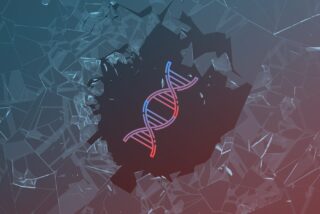
Mesothelioma researchers continually examine new methods to make treatment more effective for patients. A new study from the Massachusetts Institute of Technology (MIT) and Duke University identified a compound that can increase the effectiveness of chemotherapy.
Chemotherapy is administered to patients to damage the DNA of cancerous cells, ultimately preventing cell growth. However, more aggressive forms of mesothelioma may be resistant to further chemotherapy as a result of the cell mutations that occur. The drug named in this study was shown to decrease cell growth and help prevent mutations. The findings in this study, published in Cell, may lead to improved treatment options for mesothelioma and other cancer patients.
Study Shows Drug Helps Prevent Chemotherapy Resistance
Chemotherapy is a common first-line treatment for mesothelioma. In response to chemotherapy drugs such as cisplatin, some of the affected cancer cells use an alternative DNA repair pathway. This process, known as translesion synthesis (TLS), contributes to chemoresistance, which is the ability of cancer cells to evade or to cope with treatment.
Malignant tumors often mutate and continue to grow following chemotherapy. However, this new drug targets the repair pathway to make chemotherapy more effective.
Researchers identified a new compound that blocks TLS from occurring when administering cisplatin. The drug targets the mutagenic portion of the DNA repair pathway in order to prevent malignant cell growth.
The senior writers in the study included Graham Walker, an American Cancer Society Research Professor of Biology at MIT and Howard Hughes Medical Institute Professor, as well as Senior writer Michael Hemann, an associate professor of biology and member of MIT’s Koch Institute for Integrative Cancer Research.
Walker and Hemann tested the compound on mice with human cancer cells of melanoma and administered it with cisplatin. The study indicated that tumors shrank more in mice that were treated with the compound and cisplatin, rather than cisplatin alone.
Researchers believe that blocking the TLS process may improve the long-term efficacy of cisplatin and other chemotherapy drugs that work by damaging DNA in cancerous cells.
“This compound increased cell killing with cisplatin and prevented mutagenesis, which was what we expected from blocking this pathway,” said Walker.
Researchers Examine How TLS Impacts Chemotherapy
Walker and Hemann have conducted ongoing research about TLS to identify its impact on chemotherapy treatment. They indicated the process by which damaged, cancerous cells repair themselves is often inaccurate compared to the way healthy cells repair.
The specific enzyme that initiates DNA repair and replication, known as a polymerase, enables the cells to survive treatment. The cells become more immune to future chemotherapy treatment by developing additional mutations and encouraging cancer growth. This can ultimately result in more advanced stages of cancer.
“It’s very well established that with these frontline chemotherapies that we use, if they don’t cure you, they make you worse,” said Hemann.
One specific TLS that Walker and Hemann researched is called Rev1, which creates a second TLS DNA polymerase with Rev3 and Rev7 proteins. The drug they identified works by disrupting the interaction and the repair process of a cancer cell.
The study tested a drug screen of approximately 10,000 potential compounds and identified one that binds to Rev1. This reaction prevented it from interacting with the Rev3 and Rev7 proteins. Not only did more cancerous cells die from the addition of this compound, but those that survived were less likely to develop mutations that encourage malignant cell growth.
This drug presents an important advancement in chemotherapy treatment for mesothelioma patients and other cancer patients. Researchers plan to repeat this study in clinical trials and identify ideal patients for administration.




